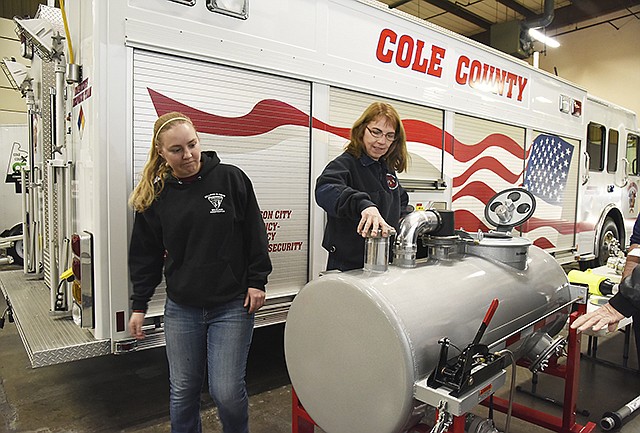Emergency responders want to be sure they know what they're doing if a tanker truck loaded with potentially flammable and explosive chemicals or petroleum products rolls over.
"When to touch, when not to touch," Chief Mike Rackers explained. Rackers is chief of the Cole County Emergency Response Team and an assistant chief of the Cole County Fire Protection District.
The emergency response team displayed a new tanker truck rollover simulator Thursday, which Cole County Emergency Management Director Bill Farr said the team plans to share to help train first responders from the 13 counties of the state Highway Patrol's Troop F region - Audrain, Boone, Callaway, Camden, Cole, Cooper, Gasconade, Howard, Miller, Moniteau, Montgomery, Morgan and Osage.
Cole County and Jefferson City personnel will receive training first - within a couple months once an instructor is available and the weather is warmer, Farr said. Once local first responders receive the training, they in turn will be the instructors for any other Troop F counties' emergency responders who want the training.
The rollover simulator is the first of its type in Missouri, Farr said.
Rackers said the Local Emergency Planning Committee (LEPC) of Cole County contributed $13,000 toward the cost of the simulator, after the response team created an outreach program a year and a half ago for tanker rollover training.
After the response team gave the same presentation to Phillips 66, Phillips 66 donated another $11,000, Rackers said.
"This is Phillips' way of giving back to the communities they serve," Phillips 66 representative Steve Walters said during a check presentation Thursday.
Jefferson City has one of four terminals on the Phillips 66-owned, 681-mile Gold Line products pipeline system that stretches from Borger, Texas, to Cahokia, Illinois. The system has a daily maximum throughput capacity of 132,000 barrels.
One barrel is equal to 42 gallons, and one tanker truck might haul thousands of gallons of product per shipment.
The rollover simulator itself is a roughly 5-foot-long, 2-foot-wide steel cylinder mounted on a wheeled steel frame. The whole tank can be filled with more than 150 gallons of water and rotated 90 degrees to simulate a liquid-filled truck trailer on its side.
The structural integrity of tankers may not be what one would like to think. Rackers held up hand-sized, circular steel plates that match the thickness of tanks - and they were only about one-eighth of an inch thick.
People also might not realize within tankers there can be separate tanks containing different amounts of different products. Between these subdivided tanks are air spaces, which Rackers said often leak when rolled over in a crash.
Jefferson City residents may recall a fiery tanker rollover crash in November 2007 on U.S. 54 at the Jefferson Street overpass.
The Jefferson City driver of the tanker, 59-year-old Jack Kaiser, was killed when the tractor-trailer loaded with 7,600 gallons of diesel fuel and 852 gallons of ethanol in separate internal tanks rolled over and burst into flames. The intense fire - hot enough to melt nearby guardrails - so badly damaged the overpass it had to be demolished and rebuilt.
Smoke was visible for miles, and residents of the Camelot Apartments on Jefferson Street and students at South Elementary School were evacuated. Students at Trinity Lutheran School were sent home early, a clinic near Capital Region Medical Center was closed, and officials at the hospital temporarily shut down the building's air handlers to keep smoke and fumes out.
Even with their structural vulnerabilities though, most of the time rolled-over tankers do not catch fire, Rackers said. The last rollover in the area he recalled was about two years ago in Eldon - and that tanker did not catch fire.
The simulator is not meant to address the response to a tanker rolling over and then catching fire - "then it becomes a fire department issue," Rackers said.
The purpose of the simulator is to help train first responders on how to offload product from a leaking tanker - ideally to prevent ignition of a fire in the first place, and to mitigate environmental damage.
The simulator - while not built to the scale of a full tanker - has all of the same valves as a real tanker truck, and those valves are actual size, Rackers said. He added the simulator has the same air pockets within it as a real tanker.
The procedure for dealing with a rolled-over tanker is to offload its product, plug any holes, cap lines and right the trailer, according to information from the simulator's manufacturer.
While the equipment is geared to simulate truck rollovers, it can be used to simulate railroad tank car rollovers, too, Rackers said.
Per Jefferson City ordinance, no trucks are allowed within city limits that carry tanks with capacities of 4,500 gallons or more of fuels and other flammable liquids, unless on U.S. 50, 54, 63, and Missouri 94 and 179; routes W, C and B; Industrial Drive and Truman Boulevard; Fairgrounds Road; South Country Club Drive from U.S. 50 to Fairgrounds Road and from Fairgrounds Road to Route C; and Cedar City Drive. Deliveries to gas stations are allowed.

